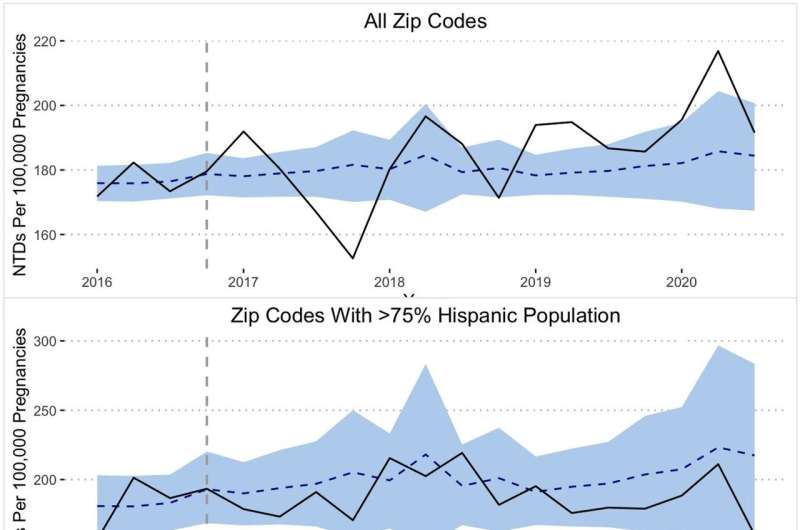This article has been reviewed according to Science X's editorial process and policies. Editors have highlighted the following attributes while ensuring the content's credibility:
fact-checked
trusted source
proofread
Hispanic women still at higher risk for births with neural tube defects after voluntary folic acid fortification

The US Food and Drug Administration (FDA) mandated folic acid fortification of all enriched cereal grains in 1996, and this regulation resulted in a reduction of neural tube defect (NTD)–affected pregnancies for the population in the United States. While this mandatory food fortification strategy is an example of a public health success,
Hispanic women in the US continued to be twice as likely to give birth to a child affected by NTD compared to non-Hispanic women. It was not until the year 2016 that the FDA approved voluntary, but not mandatory, folic acid fortification for corn masa flour products in the US to focus on the Hispanic diet staples, such as tortillas.
Since that time, the rates of Hispanic births with NTD were not significantly reduced, according to a new study published in the journal Child's Nervous System.
"Well over half of neural tube defects can be prevented with sufficient folic acid consumption before conception and in early pregnancy," said senior author Sandi Lam, MD, MBA, Division Head of Pediatric Neurosurgery at Ann & Robert H. Lurie Children's Hospital of Chicago and Professor of Neurological Surgery at Northwestern University Feinberg School of Medicine.
"Our study results show that voluntary, but not mandatory, folic acid fortification of corn masa flour products did not work to lower the rate of congenital neural tube defects in babies born to Hispanic women in the United States. Mandatory fortification of cereal grains has been much more effective in preventing congenital defects and reducing the rates of babies born with NTDs to non-Hispanic women in this country."
"Why do Hispanic communities continue to be more severely affected? Additional research, policy initiatives, and advocacy are needed urgently. Here, let's raise awareness in all communities, especially Hispanic communities, about the impact of folic acid intake on healthy birth outcomes."
NTDs are severe congenital malformations that result from failure of neural tube closure by the 28th day of gestation. The neural tube forms the early brain and spine. The two most common NTDs are spina bifida (a spinal cord defect) and anencephaly (a brain defect).
Since the FDA instituted mandatory folic acid fortification of cereal grains in 1996, the Center for Disease Control and Prevention (CDC) reported a 36 percent reduction in the number of NTDs between 1996 and 2006. The FDA approved voluntary non-mandatory fortification of corn masa flour products 20 years later, in 2016.
Dr. Lam and colleagues investigated rates of NTDs in predominantly Hispanic-populated zip codes before and after the time of voluntary fortification of corn masa flour with folic acid. They found no significant changes in rates of births with NTD in the Hispanic population.
"We know from previous studies that to achieve the desired and necessary health impact, mandatory fortification is more effective than voluntary fortification," said co-author Robin Bowman, MD, Director of Multidisciplinary Spina Bifida Center at Lurie Children's and Associate Professor of Neurological Surgery at Northwestern University Feinberg School of Medicine.
"Voluntary is similar to optional or recommended; voluntary is not the same as mandatory. We must do more to prevent neural tube defect-affected births and eliminate these serious health inequities in Hispanic families and their children."
More information: Syed I. Khalid et al, The impact of voluntary folate fortification of corn masa flour on US pregnancies complicated by neural tube defects, Child's Nervous System (2023). DOI: 10.1007/s00381-023-05945-w




















